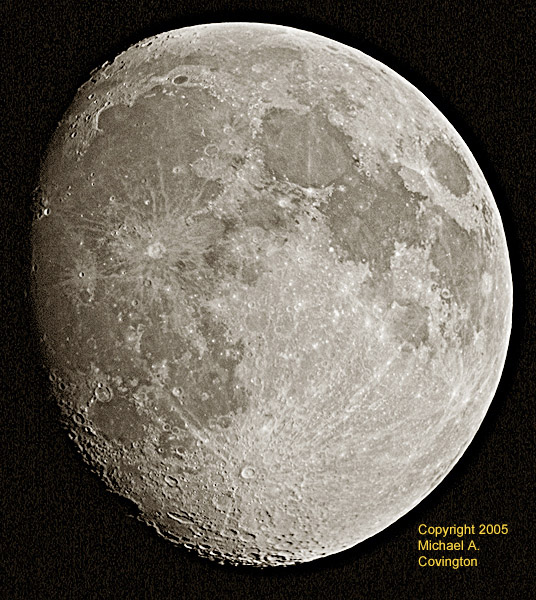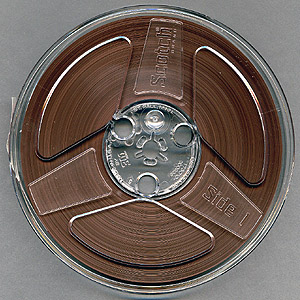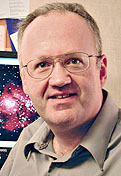 |
|
|
 |
2005
April
30
|
The hacker who hacked himself
I don't know if
this story
is true, but it deserves to be.
(German original,
with funny but irrelevant pictures,
here.)
A teen-aged "hacker" challenged another one to hack his machine.
"OK, what's your IP address?"
Apparently sincerely mistaken, the challenger gave his address as 127.0.0.1 and the hacker
broke in and started erasing disks.
In fact, however, 127.0.0.1 is the address of any computer as seen from itself.
Your IP address is 127.0.0.1. So is mine.
Any computer will talk to itself on that number.
It's commonly used for testing network software.
The real IP number is, of course, something else.
So the young hacker broke into 127.0.0.1 and busily trashed his own computer,
reporting every step in a chat room,
until he deleted enough of drive C, and then he was gone.
Sometimes justice administers itself!

|
 |
2005
April
29
|
End of the computer-game era?
In a recent
column in PC Magazine,
John Dvorak opines that
the heyday of computer games may finally be drawing to a close.
Games won't die out, of course, but the period of major innovation is past.
From 1982 (PAC-MAN) to about 1995, game players were hungry for CPU power.
Now they're not.
For the most part, games move fast enough and are realistic enough,
or nearly so.
Greater realism might not actually be desirable - just how much blood and gore do you want?
Part of the point of a game is that it isn't the real world.
This is like the way TV watchers were hungry for better picture
quality until about 1980, but color TVs since then have been good enough,
so even though HDTV is better, not many people want it.
TV pictures aren't perfect, but they're good enough that you don't miss anything
you're supposed to see.
Also, new kinds of games are no longer being invented.
There are shooter games, puzzles and mazes, adventure games, sports,
and simulations.
Only the last of these is a fertile category, and simulations require a lot of time
on the part of the player.
So does anything involving multiple human players in a network.
The original appeal of PAC-MAN and Space Invaders was their simplicity;
it took only a few minutes to learn to play them, and games could be very short.
No newly invented simulation game is going to be like that.
The other odd development is that the hottest emerging
market for computer games is
women over 40,
where computer games are (thank goodness) displacing soap operas.
[Link corrected April 30.]
The man accused of torching our library
was acquitted
after two years in jail.

|
 |
2005
April
27-28
|
Other logics
I've just placed online a short
introduction
to nonclassical reasoning, i.e., the study of how to deal with incomplete
or uncertain information.
It's not complete, of course, but it introduces the main ideas.
"Fuzzy logic" is not half of it; other nonclassical systems
are considerably more sophisticated.
This is the kind of thing they pay me to think about, at least when I'm not
doing psycholinguistic research.
I should add that "nonclassical logic" is
not a license to believe silly things.
Follow the link to find out more about it.
Asimov's laws of robotics, for instance, are highly nonclassical
because they refer to counterfactual situations
(situations other than the actual one).
That doesn't make them illogical or nonsensical.
Omega Centauri
 I got the 8-inch telescope out for a while this evening and discovered
that, sadly, due to the growth of a tree,
Omega Centauri is no longer visible
from my telescope pier.
It is still visible by standing just a few feet east of the pier,
so if I want to photograph it this year, I'll have to set up a portable
tripod there.
I got the 8-inch telescope out for a while this evening and discovered
that, sadly, due to the growth of a tree,
Omega Centauri is no longer visible
from my telescope pier.
It is still visible by standing just a few feet east of the pier,
so if I want to photograph it this year, I'll have to set up a portable
tripod there.
(What you see at the right is an image taken on film 5 years ago,
at a dark-sky site with clear horizons.)
Omega Centauri is the finest globular cluster in the sky.
It is unusually massive, and I've been told that if it were by itself,
not in the halo of our own galaxy, it would itself be classified
as a dwarf elliptical galaxy.
And it's so far south that most of the United States can't see it very well if at all.
It just skims above the southern horizon.
It's observable from Georgia but just barely visible from farther north.
Some adventurous Canadians have actually
seen it from Canada. Well, not all of Canada...they go to Point Pelee, near Detroit.

|
 |
2005
April
25-26
|
"Can you hear me now?"
When you see people talking into cell phones, do you sometimes
wonder whether there is really anyone on the other end?
Often there isn't.
I suppose faking a phone call is justified in a few situations,
such as when you feel threatened by someone who is approaching you.
But not the rest of the time.
How much of the noise that we have to endure in public places
is just play-acting?

|
 |
2005
April
24
|
Miscellany
 Nikon
has announced a couple of
new digital SLRs to more effectively
compete with Canon on price.
Pre-review
here
(scroll down for comparison of D70, D70s, and D50).
I hope to be testing a D70s soon.
[Photo from Nikon USA.]
Nikon
has announced a couple of
new digital SLRs to more effectively
compete with Canon on price.
Pre-review
here
(scroll down for comparison of D70, D70s, and D50).
I hope to be testing a D70s soon.
[Photo from Nikon USA.]
Despite our chaotic stock market,
Fidelity Real Estate Investment Portfolio Fund
(FRESX) is doing pretty well for me.
Chart
here.
This is a current chart and will always show you what's currently happening,
not what was going on when I wrote this; so maybe I'll be proven wrong!
This fund is in blue, compared to the Standard & Poor's index (green) and another Fidelity fund (red).
An interesting essay about religion and current American politics is
here,
written by the bishop of a
dissident Anglican church
just down the road from me.
Even though Christian and politically conservative,
the bishop distances himself from "Christian politics" because that can easily
be a way of corrupting both Christianity and politics.
I share that view.
But then he points out that although liberals see right-wing Christians as a threat to freedom,
they're not.
The amount of actual restriction imposed on liberals by conservatives is tiny.
For instance, despite bitter controversy, abortion is still legal; the move toward
gay marriage is rolling along; and so forth.
So what have Christian conservatives grabbed for, and gotten?
Tolerance for their own position.
Thirty years ago, it seemed as if an atheistic kind of liberalism was going to be
imposed on everybody.
Religion was supposed to be so personal that, in the public sphere,
you had to pretend not to have any, or at least promise that it wouldn't
influence your politics.
Not any more, thank goodness.
Today, it's OK to talk about Christian values in the political sphere,
and people who don't let their religion influence their behavior
are rightly known as hypocrites.

|
 |
2005
April
23
|
I haven't checked my e-mail for over 5 minutes!
One of the newest annoyances of modern life is
people who expect e-mail to reach other people instantly
as if everyone spent all their waking hours checking it.
Yes, nowadays e-mail is delivered instantly.
(I can remember when it commonly took a couple of hours.)
But that doesn't mean people see it instantly,
unless they are idle office workers who
sit around with the mailreader open all the time.
Cathy tells me this problem particularly plagues college students and
college administrators
who deal with them.
They assume that the instant the message has been sent out,
all the recipients see it.
"We e-mailed you 10 minutes before class to tell you it's in a different room..."
Students get up, walk around, attend classes... I get up, walk around, and even
do my work! Gainfully employed people don't read e-mail continuously.
Please, folks, whenever you send e-mail, allow a couple of days
for it to be received.
If you need immediate contact, use the telephone.
We've been through something like this before.
In the 1960s, telephone directories told us explicitly to let
the called person's telephone ring a long time (maybe as much as a dozen rings)
before giving up.
Apparently, in the first days of dial telephony,
there had been people who couldn't understand that it takes more
than two seconds to answer a telephone.

|
 |
2005
April
22
|
Popes and Protestants
I've just been reading what
Christianity Today
has to say about Pope Benedict and his predecessor.
Some tidbits:
- Pope John Paul II (as Pope and, before that, as bishop)
actively cooperated
with Billy Graham and with Campus Crusade for Christ to evangelize Poland.
- Pope Benedict XVI may be the first Pope who
really understands Protestantism
to a much greater depth than the usual well-educated Catholic theologian.
(The link is to an article published in 1998.)
Credit, among other things, his study at Tübingen
(where, for one month in 1987, I had the honor of being a visiting faculty member
- I've been everywhere).
- When Benedict XVI, as Cardinal Ratzinger, paraphrased the Nicene Creed in an
important statement he wrote for John Paul II, he
left out the filioque,
thereby indicating willingness to remove the biggest (perhaps the only?)
fundamental doctrinal split between Catholics and Eastern Orthodox Christians.
- When a few Bible-belt Protestants have vilified and condemned the Pope
(in a way that used to be routine),
they have faced
strong censure from their fellow evangelicals,
including the Southern Baptist Convention, which said,
in essence, "Shut up, you dummies!"
- Protestants are feeling a great need to recover the Catholic intellectual tradition,
as evidenced, for instance, by the popularity of the work of Protestant philosopher
Norman Geisler,
who is practically a Thomist.
Meanwhile, Catholic philosopher
Peter Kreeft
told me that after careful study of the
Council of Trent, he has concluded that the Catholic Faith is surprisingly close to Calvinism.
Truly, the times they are a-changing.
The only thing that's definitely dying out is liberal Protestantism.
If you make a compromise between Christianity and unbelief,
clearer heads will come along and choose one or the other of them plain and simple.
The compromise appeals to nobody.
Finally, everybody have a look at the web site of stockbroker
UBS and look at the
trademark.
With three keys on it, it's obviously the coat of arms of one and a half
Popes.
And if you can follow all those links, your nameserver is definitely in good working order.

|
 |
2005
April
21
|
Rebel Moon

To take this picture, I set up my 8-inch f/10 telescope with a 40-mm eyepiece
(giving 50×), then held up my
Canon Digital Rebel, aimed it into the eyepiece,
let it autofocus, and snapped the picture.
The same thing could be done with a much smaller 20× to 50× telescope.
There isn't anything in the picture that couldn't be seen with a 2-inch.
On the camera, I was using a 28-mm f/2.8 lens wide open. After taking the picture, I ran several
steps of unsharp masking with Photoshop to bring out detail.
I converted the picture to monochrome (to discard JPG color noise)
and then tinted it cream-colored.
This strange method actually works better than attaching the camera to the
telescope, because this way, shutter vibration can't make the telescope shake.
I have also been known to put the camera on one tripod and the
telescope on another.
Note the bright crater Aristarchus (upper left) and the huge crater Schickard,
which appears as a big black notch at the lower left.
I urge amateur astronomers who haven't explored the Moon to work through either
Découvrir la Lune
or
its English translation.
This handy book goes through the illuminated area of the moon as it waxes
from thin crescent to full, and each picture and map is printed two ways -
normal and flipped - to match the views in all types of telescopes.
I used it as a guide last night and saw the domes near Marius.

|
 |
2004
April
20
|
Habemus papam
 Cardinal Ratzinger is now Pope Benedict XVI.
Rarely is a newly elected Pope someone who was so well known prior to his election.
Some people are cheering and others are grumbling,
but nobody considers him an unknown quantity.
Cardinal Ratzinger is now Pope Benedict XVI.
Rarely is a newly elected Pope someone who was so well known prior to his election.
Some people are cheering and others are grumbling,
but nobody considers him an unknown quantity.
As a conservative Christian who watches the Catholic Church attentively from outside,
I'm glad they've elected someone who takes a strong stand for objective truth rather
than "whatever works for you." Our job, as the Pope and I both see it, is to find out
what God is like and follow Him - not make up something that gives us warm fuzzy feelings
and never objects to our plans for Saturday night.
As Cardinal Ratzinger put it just before the conclave started:
Having a clear faith, based on the creed of the church, is often labeled today as a fundamentalism. ...
Whereas relativism, which is letting oneself be tossed and 'swept along by every wind of teaching,'
looks like the only attitude acceptable to today's standards.
We are moving toward a dictatorship of relativism which does not recognize anything as for
certain and which has as its highest goal one's own ego and one's own desires.
That, to my mind, isn't hyperconservatism - it's just rationality. More quotes
here.
See especially the second of his 2 quotes on homosexuality, which, again, should please liberals anywhere.
I'm not Catholic and don't agree with the Catholic Church on everything.
But as far as personal morality goes, my only real disagreement is that
(like almost everybody!) I think the analysis of birth control in Paul VI's Humanae Vitae
is flawed. I think it pays insufficient attention to the fact that the human female is
infertile nearly all the time, and hence that fertility cannot be considered essential
to the marital union.
More about that some other time.
Recall that birth control was very controversial among Catholic theologians when that
encyclical came out, and many of them expected some forms of it to be permitted.
That's a technical point.
The rest of Christian morality isn't snagged on technicalities.
The mass media
and the public seem to expect any amount of moral teaching can be thrown aside to fit
the desires of modern man.
My response: What if the Church did give you everything you want - abortion,
gay marriage, extramarital sex. Would you join the church and support it?
No? I didn't think so. Stop kvetching, then.
[Photo from www.vatican.va.]
The legacy of John Paul II
Because of his refusal to change moral teachings, it is often alleged that
Pope John Paul II didn't change anything.
On the contrary, he let quite a bit of fresh air into the Catholic Church.
Here are a few of the main changes:
- Bible study is considerably more a part of Catholic life than it used to be.
John Paul II was a biblical scholar and teacher.
- A new
Catechism has been published,
for worldwide use,
restating all of Catholic doctrine with copious Biblical references.
[Item added April 22.]
- The Code of Canon Law was revised from beginning to end, not to change its
content, but to make it all available in one consistent volume.
- Married clergy. I'm referring to "permanent deacons," men who are ordained
as deacons in order to serve the Church in that capacity, rather than as a stage toward
ordination as priests. Permanent deacons were rare in 1978; now they're everywhere.
- Apologies for the Church's bad relations with Jews and its treatment
of Galileo.
- Communism is dead in Europe. If that's not an accomplishment, what is?
I'm told that
Quantegy,
the recording tape manufacturer, is not actually quite dead
and may resume production soon (or may have even done so).
And if you're following the library fire story, check the latest
episode
here.
I have no idea if they've caught the right man;
it's certainly a sad case.

|
 |
2005
April
19
|
No more recording tape
 The last remaining American maker of professional audio recording tape
(Quantegy, formerly Ampex)
has reportedly shut down.
(3M, whose product you see in the picture, stopped making magnetic tape
some time ago.)
Although some tape is reportedly still made in China, it's the end of an era.
The last remaining American maker of professional audio recording tape
(Quantegy, formerly Ampex)
has reportedly shut down.
(3M, whose product you see in the picture, stopped making magnetic tape
some time ago.)
Although some tape is reportedly still made in China, it's the end of an era.
The article mostly talks about the 2-inch-wide tape used in studios,
but the supply of ordinary 1/4-inch tape has also dried up.
I did a lot of tape recording as a child around age 8 to 12 - mostly music
(from records or radio), sometimes family events or my friends clowning around.
I had a Fujiya reel-to-reel recorder, half-track monophonic, that took 5-inch reels.
One day I'll write about it.
Today I still have the old tapes, together with a working Wollensak 1500SS that will play them,
and some have been transferred to CD.
Since the early 1970s, almost all home and school recording has been done on cassettes,
of course.
Cassettes have in turn been supplanted rapidly by digital recording.
I don't think I've played a cassette in two years, although we still have two
cassette decks at home and several portable "boom boxes" that will play cassettes.
The appeal of reel-to-reel tape is its higher quality.
Since about 1975, that has been a non-issue for home recording, because even
cassettes have been very good.
But reel-to-reel tape is twice as wide and moves 4 times as fast.
That gives better high-frequency response and lower noise.
More than that, reel-to-reel tape has style.
Invisible boxes (whether hidden cassettes or digital circuitry) just
don't look as impressive as big, rotating reels.
And as some musicians have pointed out, tape does sound better than digital
recording under some conditions.
The bottom line is that it's part of the intended musical effect - if the characteristics
of the tape recorder are part of what the musicians and engineers are planning on,
then it's part of their work of art, no less than the colors and sheen of a particular
artist's paints.
I've experienced one situation in which tape sounds better.
Noise pops, from scratches in records, tend to be suppressed on tape, while digital
recorders record them at full intensity.
The reason is that the tape is already operating close to the limits of its dynamic
range, and it clips the noise pops softly.
They don't go away, but they're less obtrusive than they might be.
A real danger now is that historically important unpublished tapes of musical
performances may be lost forever as the studios erase the tapes and reuse them.
The same goes for old radio programs.
Yes, they publish gibberish
The academic world has been amused by
this
curious story about a published paper that was generated
by a computer basically putting words together in random order.
You can read the paper
here.
I thank Roy Harvey for the links.
Everyone is pointing to the lack of review before the paper was accepted.
The conference that accepted it is one to which I myself have received numerous
e-mailed invitations. I have no idea what the conference is like.
What I know is that the first sentence of the paper is manifestly either false or nonsense.
It didn't take me 15 seconds to determine that.
Pretty obviously, nobody took a good look at the paper before accepting it.
I can understand that most scientists aren't qualified to judge the quality of
specialized work outside their fields.
But they should be able to tell whether a paper reports some result
even if they can't judge its significance.
Maybe scientists should go to law school.
We make fun of turgid legal language, but actually, every legal document,
especially anything submitted to a court,
has to get right to the point and reveal, right at the beginning,
why it's important, or else it will be ignored.
The incineration of the library:
Two summers ago, a fire was deliberately set in the University of Georgia's main library,
and the man accused of setting it is
finally coming to trial.
Cathy
was almost a witness to the event.
Just as she was leaving the library, she noticed an unusual smell.
A few minutes after she stepped out, the alarm was sounded.
Apart from the obvious damage, a sad side-effect of this fire, for me,
is that it wiped out the only part of the library building that still had its
pre-1974 decor and
furnishings, the way it had been when I first came to the University.
And even after a vigorous clean-up effort, the library will never smell quite right again.

|
 |
2005
April
18
|
There's a sucker born every minute...but it's not me
 Look at the return address on a letter that I received just when I was getting my
income tax data together.
Look at the return address on a letter that I received just when I was getting my
income tax data together.
No, it's not from the IRS. At least not that IRS.
It turned out to be from Fast Company, a business magazine.
My question is this: How do they think this trick will make me feel?
Do they think I'm going to admire their cleverness and how they tricked me into opening it quickly?
They got something of value from me - attention - under false pretenses.
That's not the way to win my trust.

|
 |
2005
April
17
|
There is no such thing as "identity theft"
I contend that the term "identity theft" was made up by the banking industry
- or somebody -
to divert attention away from what really happens when an "identity is stolen."
If someone "steals my identity," he's not stealing anything from me.
He's going to some bank or lender somewhere and falsely claiming to be me.
And the bank or lender is falling for the fraud and giving him my money.
He is then stealing the bank's money, not my "identity."
My "identity" is not something I have a duty to "guard."
Banks and lenders have a duty to guard against impersonators.
If they don't check people out properly, that's their fault, not mine.
And impersonation is not a newly invented crime.
It's been going on at least since Jacob and Esau.
I think the term "identity theft" is a piece of Orwellian Newspeak
perpetrated to make the victims feel guilty
for the bank's or lender's negligence.
The solution?
Make banks and lenders 100% liable for identity frauds.
If my bank is stupid enough to give my money to an impostor,
that's the bank's problem, not mine.
These points were recently made by
Bruce Schneier
and discussed on
comp.dcom.telecom.
Both of these forums frequently deal with data security and computer ethics issues.

|
 |
2005
April
16
|
It's real
The "eye" in the Great Red Spot in yesterday's picture of Jupiter
is real, as confirmed by an image sent to me by Pete Albrecht
and also by a Hubble image
here.
My wife and daughters invite you to peruse an online collection
of ugly wedding dresses.
The sarcastic comments are more amusing than the dresses.
But I'm disconcerted by the brides who dress as if they're already eager
to put marriage behind them and seduce their next paramour.
I, on the other hand, recommend
PhDComics.com to those
who want to know what academic life is really like!

|
 |
2005
April
14-15
|
Jupiter

Let this picture speak for itself.
I took it yesterday evening (April 14) with my 8-inch telescope, 2x Barlow lens,
and modified Philips ToUCam.
I recorded 900 frames of video and used Registax to select and stack the best
frames, then enhance them to bring out detail.
This is better than the best earth-based photographs of Jupiter
taken with very large telescopes 30 years ago.
Some faint marks at the left and right, concentric with the edge of the
planet image, are image-processing artifacts.
I don't think the "eye" on the Great Red Spot is an artifact,
but it may be.

|
 |
2005
April
13
|
A bright idea
 If you tried compact fluorescent bulbs a couple of years ago and
didn't like them, it's time to try again.
I think
General Electric has finally gotten it right.
Click
here
for basic information and
here
for technical data on their latest products.
If you tried compact fluorescent bulbs a couple of years ago and
didn't like them, it's time to try again.
I think
General Electric has finally gotten it right.
Click
here
for basic information and
here
for technical data on their latest products.
We recently installed some GE Soft White Spiral bulbs and are pleased with them.
Compared to incandescents, they use
1/4
the electricity,
generate 1/12 the heat, and last 8 times as long (or even more if your line voltage runs higher than 120).
Their low heat output gives them a safety advantage that people don't talk about.
If your wiring is old and the insulation is getting brittle,
then the heat of a conventional bulb is very bad for it.
Switching to compact fluorescents can literally keep your house from burning down.
You can also get more light in the same space. Most desk lamps are rated
for a 75-watt bulb, maximum. That's electricity consumption (and heat output), not
light output.
Put in a compact fluorescent that is equivalent to a 100-watt bulb, but only
consumes 26 watts, and everything is still perfectly safe.
The current generation of bulbs
has some advantages over earlier ones:
- The color of the light is fairly natural, not greenish or bluish.
- The bulbs start almost instantly and don't require much warm-up time, although they do
continue getting brighter for several minutes.
- The latest "spiral" design actually fits in place of a regular bulb - it doesn't
require extra room, the way earlier compact fluorescents did.
You can still get the old style compact fluorescents if you have room for them,
and they last longer and are slightly more efficient.
Disadvantages?
Because they put out more light at the blue end of the spectrum, compact fluorescents
attract more insects than incandescents, and they interfere more with night vision
(important to me as an astronomer).
But the extra blue also makes it easier to read by them; the eye focuses blue more
strongly than red.
The other disadvantage - theoretical, at least - is potential radio interference.
I wouldn't use them close to a shortwave radio.
But I haven't observed any problem with ordinary AM and FM radios, even when
listening to weak stations.

|
 |
2005
April
11-12
|
Religion and robots
Have you ever wondered about the theological implications of artificial intelligence and robots?
Theologian
Anne Foerst earns her living thinking about this,
and has given an interesting interview
here.
I haven't digested all she has to say, nor can I predict whether I'll agree with it.
But she hits the nail right on the head when she points out the difference between
pragmatic and ontological assumptions.
In the early days of AI, it was assumed that a human being is a machine
(and hence we can build other machines that do the same thing).
That was an ontological assumption.
Nowadays it's a pragmatic assumption; we assume that a human being is
enough like a machine that we can model (some of) it with machinery.
The psychology of having things
While at ICOSR, I picked up the latest issue of Brain (the journal) at the publisher's display
and browsed for a moment.
I found
this article (sorry, non-subscribers can only see a summary):
Steven W. Anderson, Hanna Damasio, and Antonio R. Damasio.
A neural basis for collecting behaviour in humans,
Brain (2005) 128: 201-212.
The authors argue that hoarding (collecting possessions) is a very deep instinct
which we share with rats, squirrels, and some other species.
The key idea is that the universal human desire to have possessions is
not just a conscious choice; it is a low-level drive like the appetites
for food, water, and so forth.
The instinct to have things is part of how Homo sapiens works.
That, in my opinion,
may explain why it varies so much among people whose conscious beliefs and life goals are
similar.
Have you noticed that the desire for possessions - or lack of it - is a personality
trait?
Some people live their whole lives with no more possessions than strictly necessary,
as if they were about to enter a monastery.
Others amass great accumulations of everything.
I'm somewhat toward the accumulating end of the spectrum, but not pathological
as defined by the authors.
The clincher is that injuries to specific brain regions can lead to
pathological hoarding, in which a person often can't discard anything at all
(even a used paper napkin) and feels compelled to amass great quantities
of "stuff" that is never used, studied, or organized.
Many of history's great eccentrics have been compulsive hoarders.
Now we may know what was wrong with them.

|
 |
2005
April
9
|
Eclipse photo
 Here is the lowest form of eclipse photo.
I simply held up my Baader plastic filter (which is about six inches square and normally
mounts on a telescope) and aimed the Nikon Coolpix 990 through it, at maximum zoom.
I had to set a manual exposure of 1/1000 at f/5.6 because, with the big black background,
the camera wanted to overexpose. Here are the central 128×128 pixels of the image.
Here is the lowest form of eclipse photo.
I simply held up my Baader plastic filter (which is about six inches square and normally
mounts on a telescope) and aimed the Nikon Coolpix 990 through it, at maximum zoom.
I had to set a manual exposure of 1/1000 at f/5.6 because, with the big black background,
the camera wanted to overexpose. Here are the central 128×128 pixels of the image.

|
 |
2005
April
8
|
Some research results...
Some of the research we presented this week is now on
display
here.
See especially
this one,
which reports a rather neat result.
I should explain that you're
looking at a PDF image of a 6-foot-long poster. Obviously you'll have to view it magnified.
I should also explain that ketamine - a drug mentioned in the paper - is a veterinary anesthetic that is
occasionally used in humans. Very small doses of it produce some of the symptoms of schizophrenia.
This fact is of great interest because a good bit is known about how ketamine works.
Maybe schizophrenia is the same thing. If so, we're close to knowing how to reverse it.
If not, we're not.
And last of all, I should explain that the ketamine experiments were done by Dr. Semple at Cambridge University.
So far, our entire project (in Georgia) has consisted of analyzing data collected by other people.

|
 |
2005
April
7
|
I'm back...
You thought this notebook had died, didn't you? Actually, I've just
returned from the International Congress on Schizophrenia Research, at which
two of my graduate students were presenting research. More about that later.
It was outside my specialty, but
one of the most interesting presentations at the conference was by Jim van Os
of the University of Maastricht.
It was a review of old and new findings that
cannabis (marijuana) can precipitate
severe mental illness.
This is no longer controversial - it is an established fact.
Roughly, cannabis doubles a person's risk of developing schizophrenia.
Dr. van Os's paper was a very nice job of reviewing the statistics from all angles,
considering all possible directions of causality
(e.g., does psychosis cause people to use cannabis?),
and concluding that the drug apparently interacts with an inherited genetic defect.
The article to which I just gave you a link is not quite as up to date as the
presentation at the conference.
Note added Nov. 29: This paper has been published in Schizophrenia Bulletin.
Details are on PubMed;
the No. 1 author is actually Cecile Henquet, with whom I have had the pleasure
of collaborating on psycholinguistics research.
In other news, there's a
partial solar eclipse tomorrow,
rather shallow (20% at our location), ending after sunset
(so the sun will still be partially eclipsed when it sets).
[Correction: in Atlanta the eclipse ends at 7 p.m., before sunset. -M.C. 2005 April 8]
Do not look directly at the sun without a proper
filter.
Instead, follow the eclipse by making a pinhole in an index card and letting sunlight
go through the hole onto another card a few inches away.
The spot of light will be the same shape as the visible surface of the sun.

|
 |


![]()


 Cardinal Ratzinger is now Pope Benedict XVI.
Rarely is a newly elected Pope someone who was so well known prior to his election.
Some people are cheering and others are grumbling,
but nobody considers him an unknown quantity.
Cardinal Ratzinger is now Pope Benedict XVI.
Rarely is a newly elected Pope someone who was so well known prior to his election.
Some people are cheering and others are grumbling,
but nobody considers him an unknown quantity.
 The last remaining American maker of professional audio recording tape
(Quantegy, formerly Ampex)
The last remaining American maker of professional audio recording tape
(Quantegy, formerly Ampex)
 Look at the return address on a letter that I received just when I was getting my
income tax data together.
Look at the return address on a letter that I received just when I was getting my
income tax data together.

 If you tried compact fluorescent bulbs a couple of years ago and
didn't like them, it's time to try again.
I think
General Electric has finally gotten it right.
Click
If you tried compact fluorescent bulbs a couple of years ago and
didn't like them, it's time to try again.
I think
General Electric has finally gotten it right.
Click
 Here is the lowest form of eclipse photo.
I simply held up my Baader plastic filter (which is about six inches square and normally
mounts on a telescope) and aimed the Nikon Coolpix 990 through it, at maximum zoom.
I had to set a manual exposure of 1/1000 at f/5.6 because, with the big black background,
the camera wanted to overexpose. Here are the central 128×128 pixels of the image.
Here is the lowest form of eclipse photo.
I simply held up my Baader plastic filter (which is about six inches square and normally
mounts on a telescope) and aimed the Nikon Coolpix 990 through it, at maximum zoom.
I had to set a manual exposure of 1/1000 at f/5.6 because, with the big black background,
the camera wanted to overexpose. Here are the central 128×128 pixels of the image.